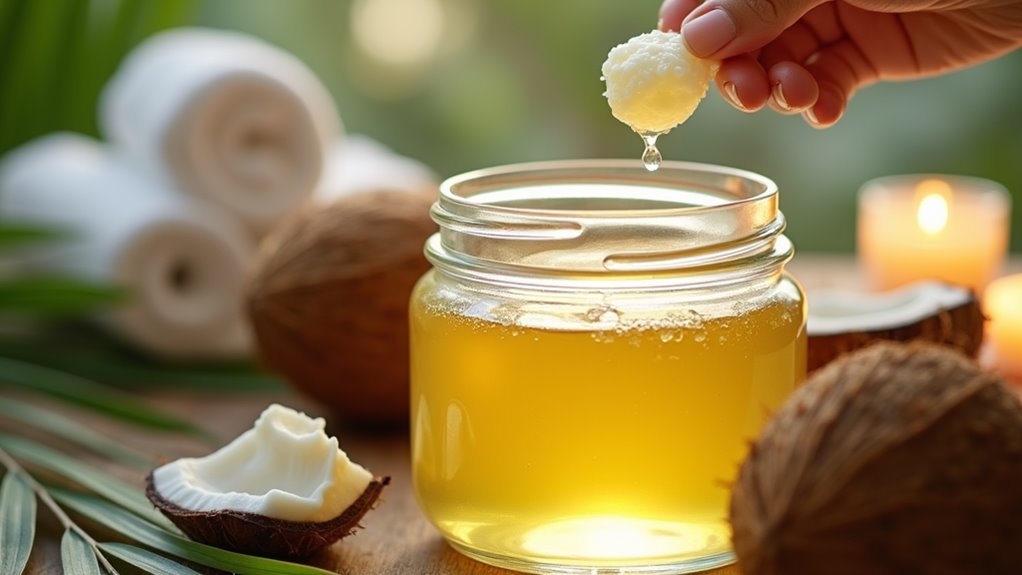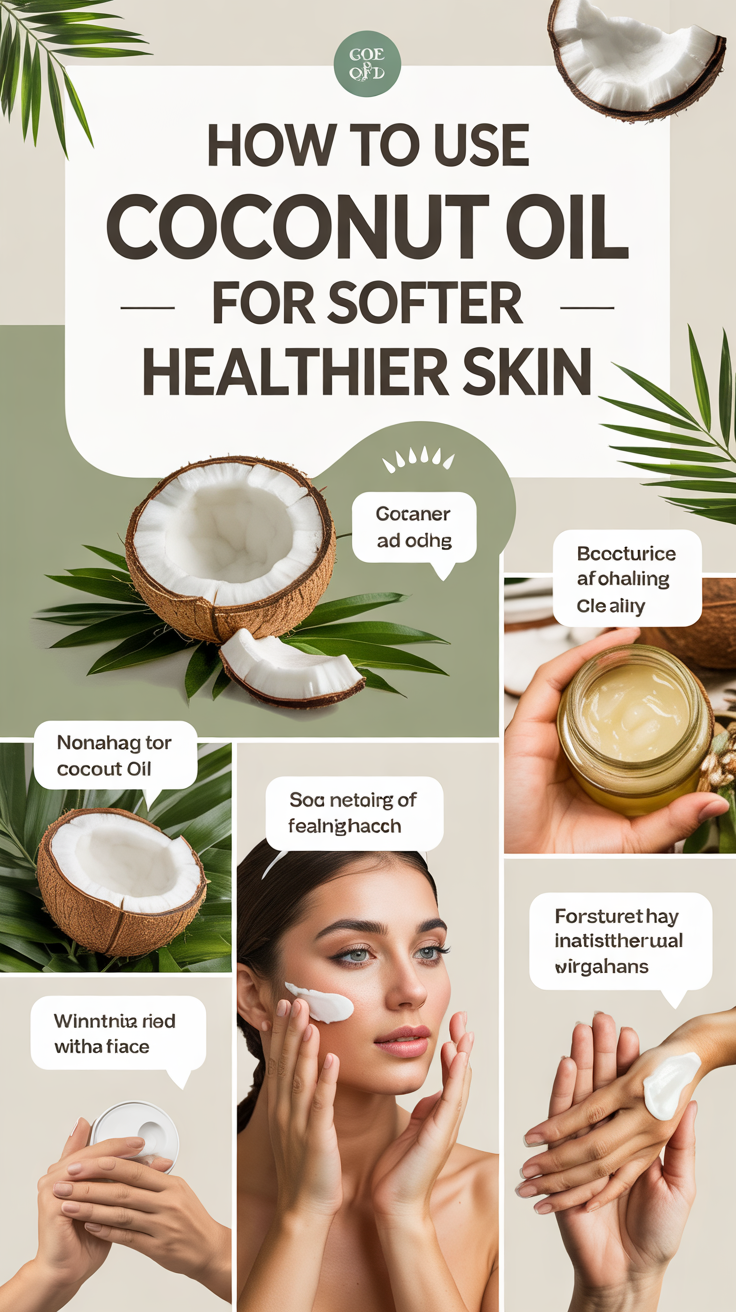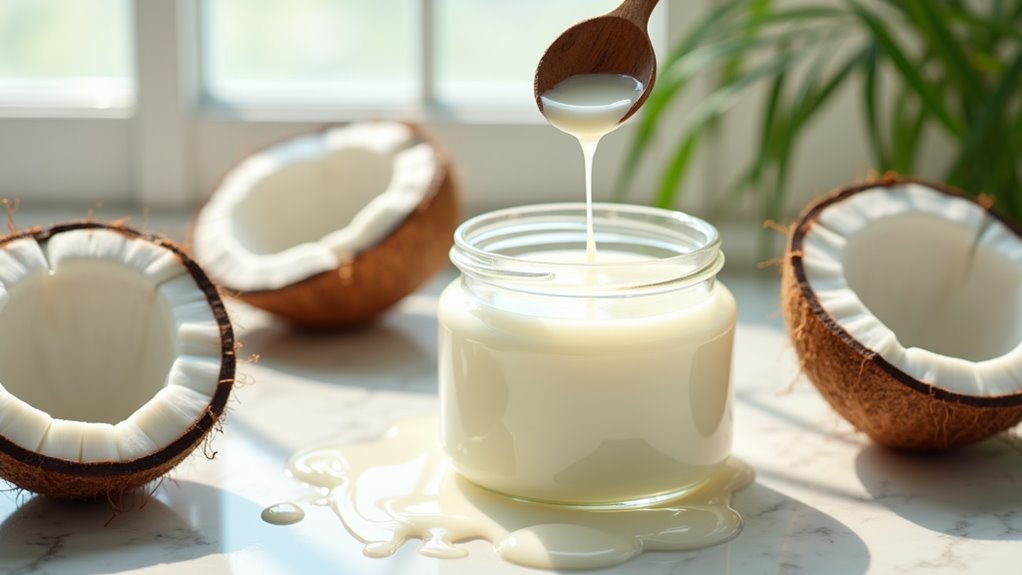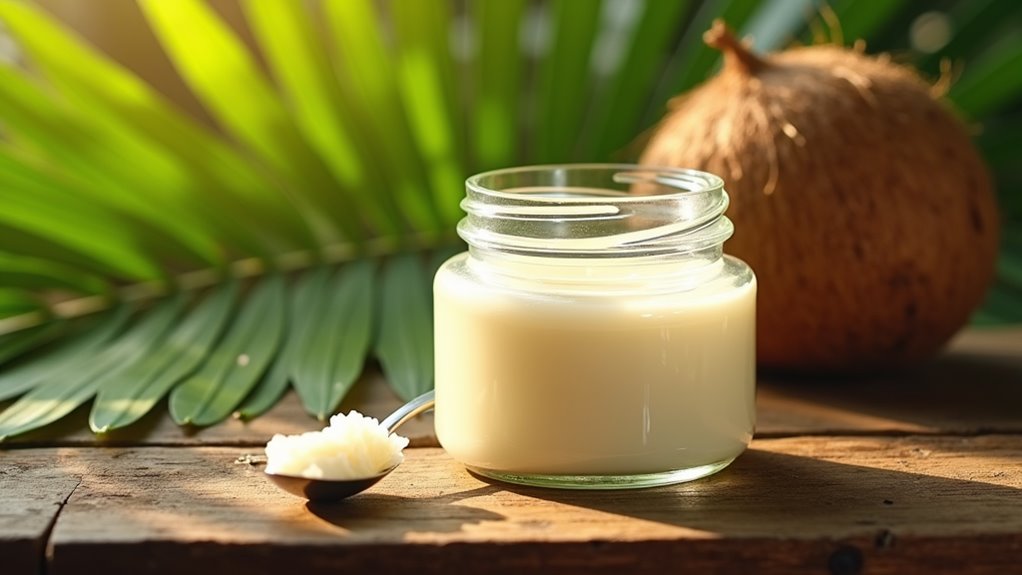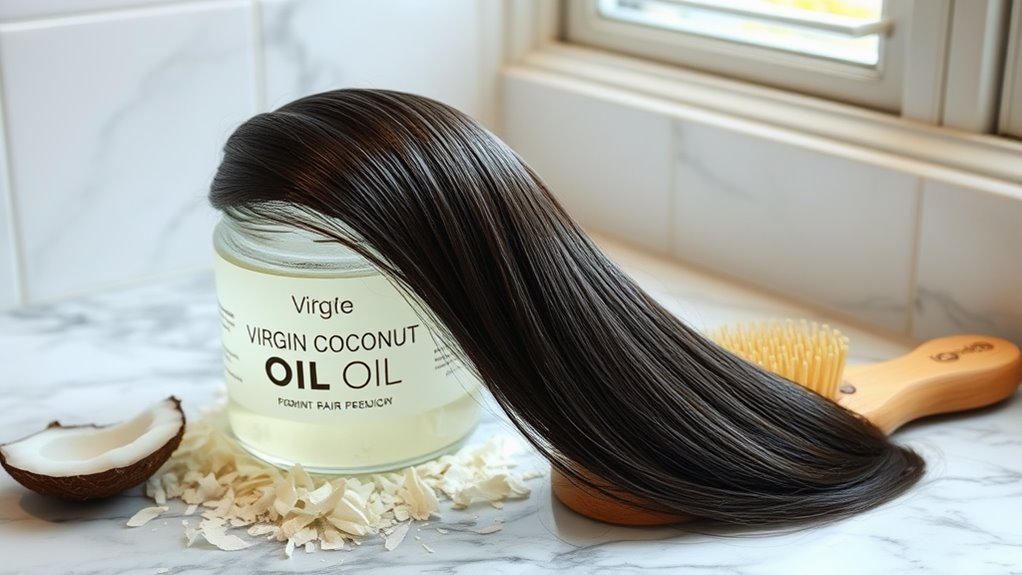How to Use Coconut Oil for Softer, Healthier Skin
If you’re looking to enhance your skin’s softness and health, coconut oil might be your new go-to. This versatile oil offers various benefits, but knowing how to use it effectively is key. From choosing the right type to incorporating it into your daily routine, there’s a lot to consider. Let’s explore the best ways to make the most of coconut oil for your skin.
Benefits of Coconut Oil for Skin Health
Coconut oil is a powerhouse for skin health, packed with nourishing properties that can transform your skincare routine.
You’ll find coconut oil uses to be incredibly versatile; it hydrates dry skin, soothes irritation, and even acts as a natural makeup remover. Its antibacterial and antioxidant qualities help protect your skin from damage, making it a go-to for anyone seeking a healthy glow. Additionally, it creates a protective barrier to lock in moisture, enhancing its hydrating effects. Moreover, its antimicrobial properties contribute to preventing skin infections and promoting overall skin health.
Plus, because it absorbs quickly, you won’t feel greasy after application. Additionally, its medium-chain fatty acids contribute to effective nourishment and hydration, promoting overall skin vitality.
Embracing coconut oil in your daily routine connects you to a community that values natural beauty and self-care, fostering a sense of belonging in your skincare journey.
Choosing the Right Type of Coconut Oil
When selecting the right type of coconut oil for your skin, it’s essential to consider its quality and processing method.
Opt for virgin or extra virgin coconut oil, as it’s extracted without chemicals and retains beneficial nutrients. This type of oil contains unique fatty acids that provide antimicrobial benefits for skin health. Additionally, the high concentration of medium-chain fatty acids in virgin coconut oil supports skin hydration and overall health. Avoid refined oils, which may lose their natural goodness during processing.
Look for organic certifications to ensure you’re using a product free from pesticides and harmful additives. Additionally, choosing organic, virgin, cold-pressed varieties retains beneficial compounds that enhance the oil’s effectiveness for skin health.
How to Use Coconut Oil as a Moisturizer
If you’re looking for a natural way to hydrate your skin, using coconut oil as a moisturizer can be incredibly effective.
Start by warming a small amount in your hands until it melts, then gently massage it onto your skin. Focus on areas that feel particularly dry. You’ll love how quickly it absorbs, leaving your skin soft and glowing. Additionally, coconut oil is rich in vitamins E and K, which helps nourish and protect your skin from damage. Its medium-chain triglycerides also provide deep hydration for your skin. Coconut oil’s antimicrobial properties can also help maintain a healthy skin barrier.
For best results, apply it after a shower when your skin is still damp, locking in moisture.
With consistent use, you’ll notice a big difference in your skin’s texture, helping you feel connected to your body and the natural world around you.
Coconut Oil for Makeup Removal
Using coconut oil to remove makeup isn’t only effective but also gentle on your skin. Simply warm a small amount between your palms and massage it onto your face, focusing on areas with stubborn makeup. You’ll find that it effortlessly dissolves foundation, mascara, and even waterproof products. Afterward, use a soft cloth or cotton pad to wipe away the oil, revealing a fresh, clean complexion. Not only does it cleanse, but it also nourishes your skin, leaving it feeling soft and hydrated. Additionally, coconut oil’s antimicrobial properties help maintain a healthy skin barrier while removing makeup, and its medium-chain fatty acids provide deep nourishment for your skin. This ancient Ayurvedic practice connects you to a beauty ritual that respects both you and the planet. Embrace this natural solution, and you’ll feel connected to a beauty ritual that respects both you and the planet.
Using Coconut Oil for Dry Skin Relief
Coconut oil is a powerful ally for anyone struggling with dry skin. Its rich, nourishing properties help restore moisture and create a protective barrier. Additionally, coconut oil contains medium-chain fatty acids that penetrate the skin effectively, enhancing its moisturizing benefits. This oil also features antimicrobial properties that can help improve overall skin health.
To use it effectively, warm a small amount in your hands and gently massage it into your skin, focusing on dry areas. You’ll feel the difference almost instantly!
For optimal results, apply it after a shower when your skin is still damp. Doing this not only locks in moisture but also leaves you feeling soft and refreshed. Regular use leads to smoother, healthier skin, ensuring you maintain that softness over time.
Embrace the natural goodness of coconut oil, and you’ll find your skin thriving in no time!
Coconut Oil as a Natural Sunscreen
While many people rely on commercial sunscreens, coconut oil can serve as a natural alternative for sun protection.
With its natural SPF of about 4-5, it helps shield your skin from harmful UV rays. You’ll love how it nourishes your skin while providing light protection.
Just remember, it’s not a substitute for stronger sunscreens during prolonged sun exposure. Apply coconut oil generously and reapply often, especially after swimming or sweating.
Embrace this simple, eco-friendly option and feel good about what you’re putting on your skin. Join others who are discovering the benefits of this versatile oil for sun care.
Incorporating Coconut Oil Into Your Skincare Routine
Incorporating coconut oil into your skincare routine can transform the way your skin feels and looks, especially if you’re seeking a natural moisturizer.
Here are four easy ways to make it part of your daily regimen:
-
Cleanser: Use it to gently remove makeup and impurities.
-
Moisturizer: Apply a small amount after cleansing for deep hydration.
-
Exfoliator: Mix with sugar or coffee grounds to create a natural scrub.
-
Body Butter: Combine with shea butter for silky smooth skin all over.
Embrace these simple steps, and you’ll feel the benefits of coconut oil in no time!
Precautions and Tips for Using Coconut Oil on Skin
Before you dive into using coconut oil on your skin, it’s important to consider a few precautions to ensure you get the best results.
First, always do a patch test on a small area to check for any allergic reactions. If you have oily or acne-prone skin, use coconut oil sparingly to avoid breakouts.
Also, remember that a little goes a long way—overusing can lead to greasiness.
Lastly, choose organic, virgin coconut oil for the highest quality.

